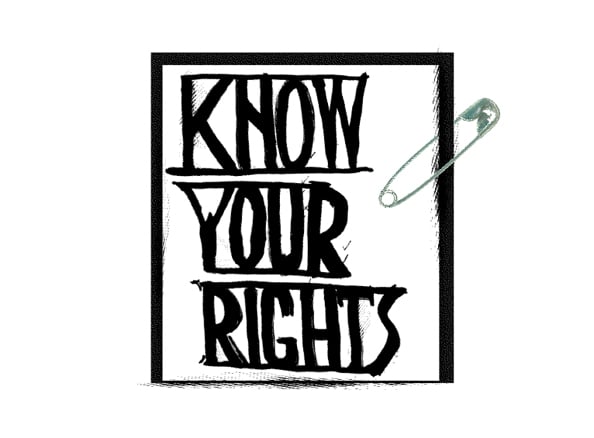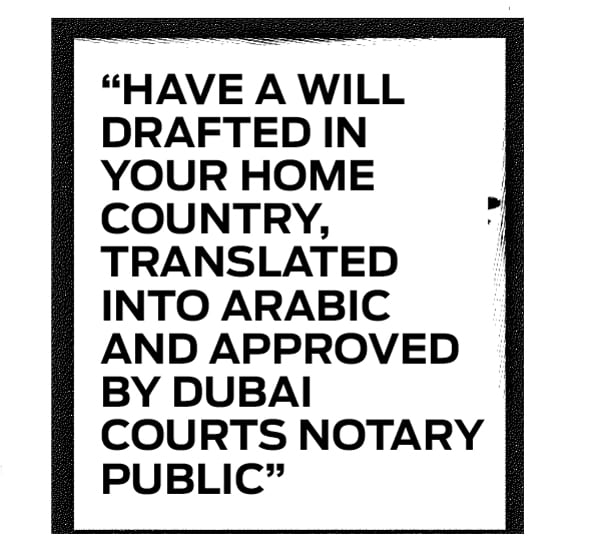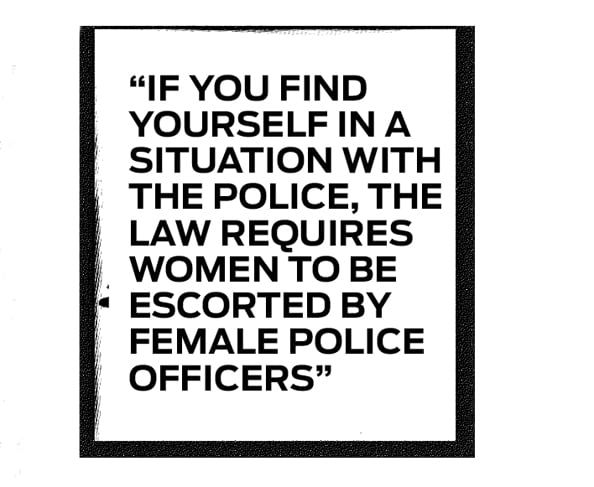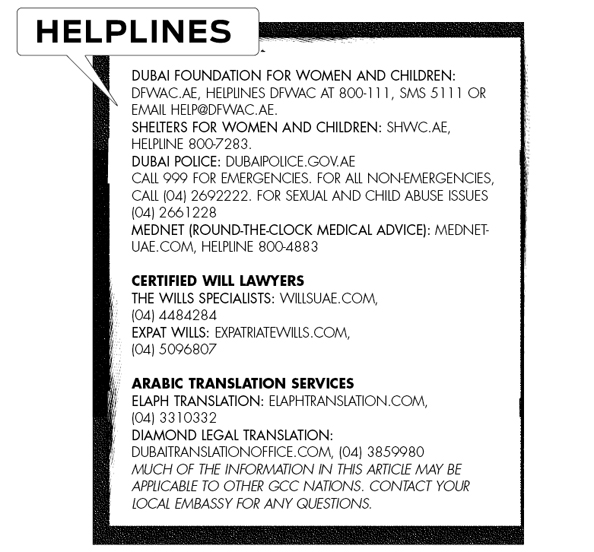It’s alarming: out of a population of nearly eight million only a small handful understand the laws in the UAE. Emirates Woman delivers a comprehensive guide to the facts of living safe and above the law in the region.
ALCOHOL
Drinking in licensed establishments is permitted under UAE law for non-Muslims. However, being an Islamic country drinking in excess or irresponsibly is frowned upon. “Muslims are not allowed to drink alcohol,” says Dr Hassan Elhais, legal consultant at Al Rowaad Advocates & Legal Consultancy. “Non-Muslims have the right to go to Dubai’s Criminal Investigation Department (CID) and apply for permission to drink, but this permission is limited – only quantity for personal use is allowed and it must not be consumed in a public place.”
Application forms for alcohol licences are available in UAE liqour stores. You’ll need a minimum monthly salary of Dhs2,000 and your purchases will be limited depending on the money you earn, so that you cannot buy in bulk. Having a licence means you can consume alcohol in your own home.
It’s vital to remember that, despite the fact that no-one will be hunting down unlicensed drinkers in hotels, restaurants and bars, it is still illegal to drink at those establishments without a licence. Step outside the venue, or get into a taxi that is subsequently involved in an incident that alerts the police, and more often than not the passenger will be checked for alcohol consumption. Expect a short stay in jail and fines of up to Dhs20,000 if you are caught.
Driving under the influence of alcohol is a very serious crime. Sometimes drink-driving will land you immediately in jail, followed by deportation if you’re an expat. It can also cost you Dhs20,000 in fines. Any drink-driving offence will leave you with 24 ‘black points’ on your licence, which means an immediate three-month suspension of your UAE driving licence. If drink-driving leads to a fatality your insurance will not cover you: blood money will likely be around Dhs200,000 and paid to the family of the deceased. You will not leave jail until the amount is paid to the bereaved family in full.
A final thing worth noting is that, while alcohol can be bought in Ras Al Khaimah, Sharjah is a ‘dry’ emirate, meaning that it is illegal to make the trip through it from Ras Al Khaimah to Dubai with alcohol.
COHABITATION & UNMARRIED TOPICS
Cohabitation with a significant other (of the opposite sex), without being married, is a serious crime. “If there is an illegitimate relation between [people who are cohabiting] it is considered a crime of voluntary debasement,” says Samia Al Heraki from Bin Haider Advocates & Legal Consultants. Transgressing the cohabitation laws carries a jail sentence of up to three years, followed by deportation, or an immediate deportation. This rule also applies to hotels, although no hotel will likely ask for proof of marriage before a stay.
Giving birth outside of wedlock is also illegal in the UAE, and it is not unheard-of for women who have just had a child to be prosecuted, followed by deportation. Marriage may be considered, before a child is born, as it is the act of birth itself that is considered a crime.
Dubai Electricity and Water Authority bills must be paid solely by the person whose name appears on the bill, says Sunil Thacker of Sunil Thacker Associates. Only one person per household can do this unless a married couple’s joint account is registered.
DIVORCE
“In accordance with divorce laws in the UAE, a [Muslim] husband can divorce his wife by simply saying ‘I divorce thee’ and he is then granted a divorce by the state,” explains Nadya Khalife from Human Rights Watch, an organisation dedicated to protecting the human rights of people around the world. “Women cannot do the same, though there are certain circumstances in which women will be granted a divorce, for example if there is violence in the home, if the husband is not paying maintenance or if he abandons the family. Another way women can divorce is called Khula – the right of a wife to seek a release from the bond of marriage – though if a woman uses this method, she loses her dowry [property or money paid to the bride by the husband].”
A Khula divorce can be applied for if a Muslim woman proves that her husband is ‘not committed’ to married life, for example if he is abusive or uses alcohol. However, this must be proven at a local court.
When it comes to divorce proceedings, whether it is better or not to carry them out in the UAE or your home country depends on the case at hand. “If a woman was the main breadwinner of the family, and she was going to be the custodian of the kids, and she had all the assets in her own name, then I would say: ‘Get a divorce in the Dubai courts,’ because she will retain all the assets in her own name, she wouldn’t have to pay any maintenance to her husband, and she would get custody of her young children,” says Expatriate Law’s Alexandra Tribe (divorce and family lawyers).
“But if a woman came to me and said: ‘My husband’s the breadwinner, we have some joint assets in the UK, I don’t really know about his pension.’ Then I would say the UK courts would be better,” she adds. “The UK courts could approve child maintenance and spousal maintenance.” Tribe maintains that it is vital to be aware of your husband’s assets, so you stand the best chance of a reparative divorce settlement.
CHILD CUSTODY AFTER DIVORCE
Child custody is known as Hadana, an Arabic phrase that means holding a child close to one’s heart by protecting and educating. UAE law makes a clear distinction between the roles of the ‘guardian’ and ‘custodian’. The guardian is charged with securing the child’s finances, education and other important affairs. The custodian, on the other hand, is the person who physically takes care of the child from day to day.
Joint custody of children is not possible in the UAE. And in a reflection of local traditional gender roles, generally upon divorce a mother will be given custody while the father becomes his child’s guardian. This is contingent on the mother not re-marrying. In that case, the mother’s sister may take care of the child. If the wife does not have a sister, then custody will be passed to the next female kin on the mother’s side of the family, for example her mother, or a cousin.
Boys will stay in the care of their mother until age seven or eight (depending on court rulings) and girls until age 13. Afterwards custody of a child may be transferred to the father or the father’s family. However, the age may be extended by the court if it is deemed to be in the best interests of the child. A male child will then stay in the care of his father until he becomes a teenager (13 years old), while a girl will stay with the father until she is married, or is earning enough to cover her own living costs.
Because the UAE is not a signatory to the 1980 Hague Convention on the Civil Aspects of Child Abduction, foreign court orders regarding child custody are not enforceable in the UAE. They may, however, be submitted as part of a UAE child custody case. This is especially important to note in light of the Emirates’ non-recognition of joint custody. If a foreign-based parent has been granted joint custody by his or her local laws, this will not carry in the UAE. Therefore, because of the UAE’s refusal to recognise joint custody, cases of parental child abduction to the UAE are becoming an increasingly common and fraught occurrence.
The benefit of the child is paramount in Emirati custody law, and it’s possible for a father to lodge a complaint that his former wife is unfit to take care of their offspring. Thus ensues a rigorous legal testing process through which the custodian must be cleared as honest, of sound mind, capable of raising a child, free of infectious disease and not having been convicted of a serious crime. Appeals in custody cases may be heard if lodged up to 30 days after the original decision was made.
An important clause in custody laws in the UAE is that a parent have the same religion as his or her child. The religion of the child is determined by the father. Therefore, if the father is Muslim, the child is also Muslim and the mother’s faith must be Islamic in order to be considered for custody. If the mother is not Muslim her custody may be annulled unless a judge decides otherwise.
It’s also vital to note that a divorced mother cannot travel outside the UAE with her child without written approval from the child’s father. A father may even place a stop order on his former spouse travelling with their child: if this is done, the mother will be stopped from foreign travel by airport officials. A mother is able to relocate her and her child(ren) to another town or city in the UAE, as long as the move does not hamper the education of the child(ren), or cause the father to suffer undue hardship.
Read: Know Your Maternity Rights In The UAE
Read: Employment Law In The UAE
CHILD CUSTODY AFTER DEATH
Following the death of a husband, there will be a court case to determine custody of the children. This will not take long and will almost certainly award the mother custody. However, it is vital to include in your home-drafted will someone living in the UAE as an interim guardian for your children – temporarily in the UAE as well as long-term. If you do this, the children will be awarded guardianship by the authorities until the case is heard. If not, your children may be taken into institutional care until that time or, in the event of the deaths of both parents, until the next male relative can be located (wherever he is in the world, and this may take some time).
It is the same as with the death of a mother as with that of a father, with one exception: in the UAE children will always need to be looked after at least partially by a woman. “If the father wasn’t able to have a female relative to assist with custody, it may be that the mother’s mother, or father’s mother, will take the responsibility,” says Alexandra Tribe.
WILLS
No-one arrives in a new country assuming the worst will happen, but being prepared could save you or your family years of hardship. A will is the foundation for any bereavement situation. “Failing to have a will will see your life’s hard work (your estate) divided according to how the state or a solicitor sees fit,” says Acuma Wealth Management’s Rupert Connor.
Firstly, make sure that you have a will drafted in your home country. “For non-Muslim expats the wills are in accordance with their national country, and a will will always be taken into consideration as an alternative to Sharia law,” says Connor. Sharia law will hand over any assets to male members of the deceased’s family. Therefore, if you are a non-Muslim woman it is essential your partner gets a will made in his home country.
When an expatriate dies in the UAE, his or her assets are frozen. This includes joint accounts, so it’s a good idea, if married, to have individual bank accounts with funds totalling enough to survive for the six to nine months it could take, after Sharia courts have cleared all possible debts and payments, to have those accounts unfrozen. However, it’s important to note that having a will speeds up that process considerably.
UAE courts do recognise foreign wills. It is also possible to have a certified UAE lawyer draft a local will too, which can speed up proceedings. This must be carried out by government-approved firms.
Foreign wills have to be attested by the consulate of your home country, then translated and confirmed by the UAE Ministry of Foreign Affairs. The translation must be carried out by an authorised Arabic translation firm and rubber-stamped by Dubai Courts Notary Public (DCNP), located at Al Qusais and Al Barsha. It’s possible to have this done post-mortem with no hassle, but having a pre-approved translation will speed up proceedings.
When it comes to retrieving assets after the death of a family member or spouse, it’s important to have an assets list, commonly held alongside local wills. In the UAE, all that is necessary is to have a list of assets held in the Emirates. This can be carried out by your lawyers. In the case that a husband and wife have a joint company and the husband passes away, her 50 per cent is intact and the rest will be distributed among the family in accordance with Sharia law, ie being passed down the male members first. A will would not cover this, as a jointly-owned UAE company is considered an immovable asset that is governed by Sharia, like property. This is why the offshore registration route is recommended.
RESIDENCY
A deceased expat’s visa will be cancelled upon the moment of death. For spousal and family visas the same applies, as their sponsor is no longer alive. Thus there is a 30-day period after death in which to leave the country. When the 30 days are up, that person may re-enter the UAE on a tourist visa subject to the visa agreements with his or her home country. Contact the embassy of your country in the UAE for more information in this regard.
There is a law which states that freehold property owners in the UAE can apply for a six-month renewable residency visa. Thus, if the family is attached to property owned in the UAE, there is a way to stay in the country longer. Also, if both spouses are employed, both should be sponsored by their employer, and therefore not subject to the 30-day rule.
The situation regarding the handling of rentals after the death of the person whose name appears on the lease is difficult. Several companies refused to comment for this article, and there’s confusion about the rights the other tenants have, ie the family of the deceased, retain after death. With this in mind you should consult your landlord and clarify the situation before moving in.
Read: 10 Things to Avoid When Buying Property In Dubai
Read: Dubai Ranked Among Top 5 Places to Live
PROPERTY AFTER DEATH
Fail to draft your will, allowing family to seize your assets, and your case will be deferred to Sharia, by which assets are divided among family members on a rigid and complex basis. Sharia deems that a childless woman is entitled to a quarter of her deceased husband’s assets. If children are involved, that amount reduces to just one-eighth.
With property holdings, legally known as ‘immovable assets’, the law is complex as it’s not subject to foreign wills. “Even if there is a will in place, there’s only an increased chance of your wishes to be taken into account if you specifically state to whom the property is to be left to,” says Connor.
There is a direct contrast between the UAE’s civil code and Sharia when it comes to property held in the country. Some believe that an expatriate’s will should be honoured when it comes to immovable assets; others do not. Ultimately it’s down to the courts to decide. The best way to combat this, says Faizal Latheef of Habib Al Mullah and Co, is to “purchase the property in the name of an offshore company. If the investors are husband and wife, both the spouses can be made equal shareholders in the company.
“The memorandum of association can include a clause stipulating that upon the death of one of the shareholders, the other shareholder becomes the sole owner of the company, who in turn ‘owns’ the property,” adds Latheef. “Their children can also be introduced to the company in due course as a means of passing on the assets through the offshore company. This may technically bypass the provisions of the Sharia law as shares in a company are not considered to be real property, and resultantly, the said laws may not apply.”
DOMESTIC VIOLENCE
According to Human Right Watch, the UAE Federal Supreme Court has upheld a husband’s right to beat his wife and children or use forms of punishment or coercion to discipline them. “There was a case a while ago that ruled that a husband has the right to discipline his wife so long as he doesn’t leave any marks,” said Nadya Khalife.
Although women are misled into thinking the law will not protect them against violence, Dr Hassan Elhais, legal consultant at Al Rowaad Advocates & Legal Consultancy, says the law is clear that it’s unacceptable. “No slapping, no beating, no boxing. These are all crimes. If there is any mark for any length of time – even a few minutes – the woman has the right to get a divorce, custody of her children, expenses, compensation, everything. This is something every woman should know.”
The problem with domestic violence is proving it. Elhais advises: “Any time a husband hits the wife she should go directly to a government organisation and file a report. Go to hospital and get the medical records that can be used as evidence. Make sure that somebody, a friend or colleague, knows. The wife should keep in mind that Sharia law protects the wife more than the husband and protects the children even more than this.” Sunil Thacker, of Sunil Thacker Associates, warns that authorities “generally view a husband-wife relationship as a personal contract and will not intervene unless the person proves that husband has, and continues to, cause harm.”
RAPE AND SEXUAL ASSAULT
Rape laws in the UAE can carry the death penalty for offenders. However, sex outside marriage is also a serious crime, and there have been many cases where women who report sexual crimes have been arrested themselves. “Often women are reluctant to report sexual assault, fearing they’ll be charged with adultery, as consensual sex out of marriage is not legal,” says Human Rights Watch’s Khalife.
Marta Dalelv is a 24-year-old Norwegian woman who reported being raped in March this year. Her attacker was convicted and sentenced to 13 months in jail for extra-marital sex and alcohol consumption. But Dalelv was herself imprisoned for 16 months for three charges including sex outside marriage. The high-profile case, and the outcry that followed, forced UAE authorities to pardon Dalelv. But her story is far from unique in the country.
Even if the attack occurs after consuming alcohol, Elhais urges women to report it as soon as it happens, and accept the charge of alcohol consumption. Waiting to report the crime will adversely affect its credibility.
It’s arguably more difficult to ascertain non-consensual sex in a UAE court, although several lawyers contacted claimed it’s dealt with on a case-to-case basis. “If a woman reports she was raped, and has had relations with the man before, and if there are phone calls, messages and correspondence between them that prove they have agreed on adultery, this will work against her in court,” says lawyer Elhais.
If an attacker is unknown to the victim this problem is negated. But previous issues mentioned here will still arise.















